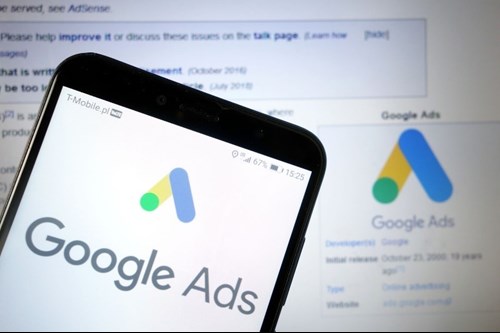Should You Bid on Your Branded Keywords?
What are Branded Keywords in Paid Search?
A branded keyword is a search term that includes phrases used by potential customers of a business to query the name of a brand, variation of a brand name, or name of a specific product. In contrast, non-branded keywords do not reference a brand name or any part of it.
Should I Bid on My Own Branded Keywords in Google Ads?
In most cases, yes! You should be bidding on your own brand in Google Ads and other similar pay-per-click (PPC) driven systems.
This article will outline the benefits of bidding on branded terms. While that can have positive results, there are several reasons why you might also want to avoid bidding on branded terms and consider spending those dollars elsewhere.

Reasons to Bid on Branded Phrases
Here are some examples and instances below that may or may not apply to your specific organization.
- Branded Paid Search Performs Well
Branded keywords tend to perform better than non-branded targets with lower cost-per-click (CPC), higher click-through rates (CTR), and excellent conversion rates. Agencies are aware of this fact.
As a result, many PPC Agencies suggest that you target branded terms without giving the strategy a second thought. This helps inflate performance and appear as though the PPC campaign is performing better than it is.
To protect yourself from wasting limited advertising dollars on branded terms, be sure that you’re getting separate PPC reports for Branded vs. Non-Branded strategies.
Provide your Agency with details about the processes they need to follow to ensure branded searches won’t match to non-branded campaigns (and vice-versa). Request for proof that this is being done properly. Reports are typically provided through Google and MSN search terms.
- Buying Branded Search Prevents Conquest by Competitors
Whether or not you choose to bid on your own branded terms, it’s possible that your competitors are buying your branded phrases. This allows competitors to take advantage of whatever brand equity you’ve created and poach your traffic and sales.
Many organizations choose to buy their own branded terms simply to prevent this situation from happening, and thus protect their branded impressions, clicks, and potentially revenue.
- Buying Branded Search Prevents Affiliates/Resellers from Poaching Revenue
Competing companies aren’t the only organizations you need to worry about. Savvy affiliates and resellers are likely to run a branded paid search strategy if you aren’t specifically denying them the possibility.
Why would they do this? Branded search is cheap and performs exceptionally well. If there’s an opportunity to purchase your branded phrases, they will. In turn, those terms and phrases will be used to generate sales and your competitors will happily collect commissions based on that strategy.
This is common practice in certain industries where the end seller can offer a customer a discount to “book direct” (like online travel agencies, hotels, airlines, car rental companies). It also occurs for any products or services that have primary versus secondary markets, such as ticket sales.
Additionally, this is extremely common with affiliates and coupon companies. They bid on branded terms as often as possible to decrease their acquisition costs and increase their revenue shares.
To prevent this from happening to your company, USIM suggests setting specific “swim lanes” for keyword targets and setting CPC limits that your partners are allowed to spend.
- Microsite or Landing Page has a Higher Conversion Rate than Your Website
If your microsite or landing page converts more effectively than your full website, this is a compelling reason to direct traffic to your most effective-converting platform.
This is a common practice among industries that sell expensive products and services, such as:
- Education
- Healthcare
- Financial Services

This strategy works well for any organization that has large amounts of information on their website NOT relevant to new customers and might distract visitors from the conversion funnel. This includes websites with information for:
- Investors
- Employees
- Current Customers
- Legal Information

- Your Long-Tail Branded SEO Strategy Isn’t Working
If you have poor long-tail branded SEO configuration, and trouble directing branded search queries to internal pages of the intended site, then it may help to run a branded paid search strategy. This funnels visitors to the pages that best match their intent.
To find out if you’re being impacted by this issue, go to Google, and conduct branded searches for your products and services. Include both your brand name and the product or service in the query.
If Google keeps showing your Home Page at the top of the search results, then your long-tail branded SEO strategy isn’t working well. Most likely, you’re missing out on conversions by forcing visitors to arrive on the Home Page and then having visitors attempt to discover the page they truly wanted by utilizing your traditional navigation menu.
If your internal product and service pages are ranking high enough to send visitors to those pages (rather than the Home Page), then your SEO configuration should be working to your advantage.

- Paid Search Results are More Customizable Than Organic Search Results
Paid search ads can be customized more easily (and quickly) than organic results providing additional flexibility when utilized.
To take advantage of more customizable ad copy, or other features like ad extensions, you should consider testing a branded search strategy utilizing these features which aren’t available to organic listings. This can work extremely well for improving conversion rates.
- Your Branded Organic Listings Aren’t Generating Clicks
Google has introduced so many new features to the SERPs over the past several years, including Knowledge Graph, Carousel, Maps Listings, and other content. This can result in your branded organic results being pushed far beneath the fold causing you to lose clicks.
This situation is common for organizations that have multiple physical locations, or new websites that don't rank well for branded search queries.
An immediate remedy for this situation is to run a paid branded search strategy allowing you to place your links above the extraneous Google features. This essentially allows you to take back control of your own branded search results.
This strategy should be tested to see if there is an incremental increase in click-throughs while branded ads are being run.

- You Need to Know Which Specific Keywords are Generating Conversions
Due to limitations in Google Analytics, it’s not possible to tell which specific keyword phrases are generating organic conversions.
This data can be extremely important in helping to guide business decisions such as naming your products, marketing, prioritization in the product pipeline, R&D, new features, and product line expansions, etc. The details are directly accessible to paid search marketers.
To find out which specific branded search terms are generating conversions (or generating sales), then you should certainly be running branded paid ads to get data from Google Ads, which isn’t available through Google Analytics.
- You Want to Absolutely Dominate the Search Results
To take up as much space as possible within Google’s results, you should be dominating the top of the SERPs. To get there, you need to bid on branded keywords to achieve maximum coverage for any branded search query.
There are several studies that conclude having multiple listings on the same search results page leads to an incremental increase in clicks and traffic.
Since it’s possible and affordable to bid on branded queries, any organization looking to dominate the search results and maximize traffic will want to at least test bidding on branded search terms.

- You Want to Monitor Branded Search Volume Over Time
It’s possible to measure this metric using tools like Google Trends, but Trends has its limitations. A more accurate way to measure branded search volume is to simply purchase branded search ads.
This data can be valuable in determining how well other forms of advertising are performing, including offline and non-digital advertising. Those tend to generate an increase in branded search volumes.
We would expect to see branded search increase during the run of a successful television or radio campaign. TV and radio impressions should be driving your target audience online to search on Google for your brand by name.
Branded search volume data can also be used to gauge fluctuations in seasonal demand and in understanding overall brand awareness.
How To Find Out if Someone Else is Buying Your Branded Terms
Before we explain the reasons why you wouldn’t want to buy branded terms, let’s first look at how to determine if someone else is already buying your branded traffic.
This is important in the decision-making process as you will have more compelling reasons to buy branded traffic if one of your competitors, or perhaps even an affiliate or reseller is buying your traffic out from under you!
To find out if your branded terms are being bought by someone else, follow these simple steps:
- Perform a Google search for your brand name directly on Google, and using the Google Ad Preview Tool
- Look to see if any competitor’s ads are appearing in the paid results, above your organic listing
- If your organic listing is at the top of the results, without any competitors serving ads against your branded terms, then you may be wasting dollars bidding on branded clicks that your organic listing would attract anyway
However, if there aren’t any competitors bidding on your branded terms, it may still be worth bidding on them anyway. Google and other third-party research platforms continue to insist there’s an incremental increase in total clicks when an organization presents both a paid result and an organic result on the same page.
There are several theories about why you’d see an increase in clicks, including:
- Some users are more likely to click on one or both listings when they see the brand has both a paid and organic result. That signals trust, making the brand look more authentic and more like a “big brand”.
- Paid Ads can be tailored and customized to entice a higher click-through rate (CTR) than organic listings, especially with the additional features that Google allows adding to your Paid Ad
Some users will click both listings, the paid result, and the organic result. To decide if bidding on branded terms is the right strategy for you, we suggest running proper tests to measure unique users, not just total users, or sessions.
You can also use tools like SpyFu, SEMrush, and other similar platforms to determine which competitors are being shown different variations of your branded search terms and who is buying your branded terms.
Reasons to Avoid Bidding on Branded Phrases
As mentioned at the outset of this article, there are times when an organization would not benefit from buying branded traffic.
- None of the Above Examples Apply to You
If you read through all the reasons to buy branded queries and none of them applied to your organization, that’s a good sign you don’t need to bid on branded search terms.
- You Want to Save/Redirect Advertising Budgets
There’s no reason to pay Google, MSN, Yahoo, or anyone else for clicks that you would have captured with an organic result (for free!). It’s important to understand whether your branded paid search ads are generating incremental new clicks or simply taking clicks from your organic results.
To determine how heavily branded paid search is impacting organic performance (assuming you’re tracking conversions by channel), try the following:
- Run a test with branded ads on/off during comparable timeframes, analyzing total organic conversions versus organic plus paid conversions and further analyze ROI.
- Compare total site-wide ROI between the tests
- Even if overall revenue is slightly higher, consider what impact the branded search investment could have made elsewhere
If you’re not tracking conversions, but want to test the same, try this instead:
- Analyze unique users from search with branded ads turned on vs. branded ads turned off
- Determine the value of any incremental users that arrived when branded search was live and compare that value to the spend required to acquire those visitors
- Consider your ROI you could have achieved by reallocating that spend to another marketing channel and only continue buying branded search if it is outproducing competing strategies

Other Things to Consider When Running Branded PPC Ads
Should you choose to run branded PPC ads, you’ll want to take the following into account, as these can have a huge impact on overall campaign performance.
- Split Branded vs. Non-Branded Performance
Always look at the performance of your PPC campaigns separately, measuring the branded strategy and the non-branded strategy individually.
This is critical to understanding just how well your campaigns are performing and ensuring that you’re not wasting money on either side.
- Use Negative Keywords to Avoid Overspending
Branded search can be generated by all sorts of different queries, not just by users looking for your brand because they want to buy something from you.
It’s critical that you utilize negative keyword lists to ensure you aren’t paying for branded traffic that has no actual sales potential. Make sure to eliminate any branded phrases that include terms like:
- Job related terms: Glassdoor, hiring, jobs, careers, salary, etc.
- Account related terms: My account, login, cancel order, customer support, customer service, etc.
- Negative-perception terms: Fraud, etc., (unless you want to pay to drive those users to a page you’re carefully constructed for PR purposes/reputation management)
Examples of Organizations That AREN’T Running Branded Search
As stated throughout this article, most organizations will probably want to pay for branded search traffic, but there are instances where it doesn’t make sense to spend the budget on this strategy.
Here are several examples of organizations that have chosen (wisely) to avoid paying for branded traffic:
- A small-market lodging with a limited budget who has a unique brand name that’s already ranking at the top of Google’s search results
- A regional restaurant with a limited budget that has organic listings and Google Maps listings at or near the top of the search results for branded queries
- An entertainment venue with substantial brand awareness, a high percentage of branded clicks that are conducted for research purposes (rather than direct sales behavior), with a prominent organic listing and Google Maps listings
In all three of the cases above, it doesn’t necessarily make sense to purchase branded searches, as the organic results and Google Map listings are doing the heavy lifting required to generate traffic.
Is Branded Paid Search Right for You?
Now that you know everything you need to know on branded keywords, you can decide if branded paid search is right for your organization and give these strategies a try to see how they impact ROI.
The only way to find out for sure whether it’s a good idea is to test it, measure the results, and then act accordingly.
If you need assistance determining how best to approach any part of the paid search process, please consider contacting USIM so our Search Engine Marketing experts can review your situation and provide a customized paid search strategy.
